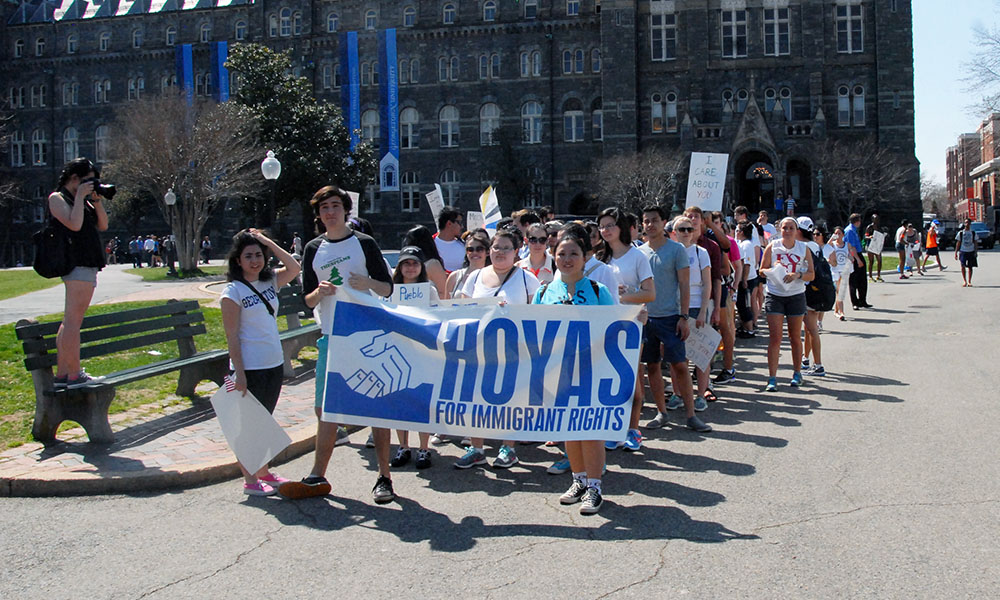On Wednesday, April 10, a group of over two hundred Georgetown students and members of the Georgetown University Immigration Coalition marched from the front gates of the University to the Capitol building to meet with the citywide A10 Immigration Reform Rally. The group joined thousands of other protesters who were rallying for a legal path to citizenship for the over 11 million undocumented immigrants in the U.S.
“For too long, our communities have suffered under a defective and outdated immigration system that stifles our economic growth, makes political scapegoats out of immigrants, and tears families apart. The time is now for justice. The time is now for citizenship!,” read the Facebook event created by the GU Immigration Coalition calling for students to join the rally.
This is not the first time Georgetown students have shown their support for and interest in immigration reform. This past Spring Break, students traveled to three border destinations—El Paso, Texas; Tucson, Ariz.; and Immokalee, Fla. through the Alternative Spring Break program in order to explore immigration issues. In addition, Georgetown has offered students other opportunities to further develop their passion for the issue.
“I’ve been working with the immigrant community for all four years,” said Cristina Gil (COL ’13), board member of Hoyas for Immigrant Rights. “I think my perspective has changed a lot coming to Georgetown, because we have students here that are undocumented, so it hit home harder than I expected. It strengthened my passion to stay on it. I did the march my freshman year in 2010, when immigration first started kicking and pushing harder. That was where the DREAMers came into effect.”
DREAMers are undocumented immigrants who would be eligible for the Development, Relief, and Education for Alien Minors Act, proposed in the Senate in 2001. The DREAM Act aims to provide conditional permanent residency to immigrants that came the U.S. at young ages and were educated in its public school systems. The profile for immigrants eligible to be effected by the DREAM Act fits a portion of the immigrants that currently attend Georgetown. Without permanent residency, these students will be deported shortly after graduation.
As one of the main advocates for the DREAM Act, President John DeGioia has expressed his support for the passing of the legislation, emphasizing its importance to both the Georgetown community and to the country as a whole.
“As a University in the heart of the nation’s capital, working to understand the impacts of globalization and the responsibilities we have in a new global context, it is our job, as educators, to support all of our students, including those who were born abroad, and to encourage passage of this legislation,” said DeGioia in a commentary to the American University Radio in December 2010.
“Passing the DREAM Act is an essential step … It will not only help these future leaders, it will enrich our campuses and make our country stronger,” DeGioia said.
However, some students still believe that Georgetown is behind the curve in the conversation about immigration reform, especially when talking about student awareness on these issues.
“A lot of us don’t know that there are undocumented students on this campus, and there are a lot of students that come from mixed-status families; my own parents are undocumented,” said Zenen Jaimes Pérez (SFS ’13), board member of MEChA Georgetown. “These are the daily realities of a lot of students on campus and I think that that’s what’s kind of ignored.”
Georgetown students plan to continue with their efforts to promote comprehensive reform in the way students conceive immigration issues. “The next step is going to be advocacy. We are going to have a day of federal policy advocacy up here on the hill. We are going to start asking people to call their members of Congress through a coordinated effort of the 15 groups in the coalition,” Jaimes Pérez said.
“We will hopefully see the bill come out in the next two weeks and from there we are going to see what missing pieces there are from the bill,” he added. “For example, there has been talk that LGTBQ inclusive immigration reform is not going to be a part of the bill, meaning bi-national couples aren’t going to be protected. Since GU Pride is in our coalition, we will talk about what this means and how we are going to get those rights back.”
The agreement on the proposal to modify the current immigration law is expected to be made public by next week, after which the Senate will vote on the bill before it moves to the House of Representatives.





